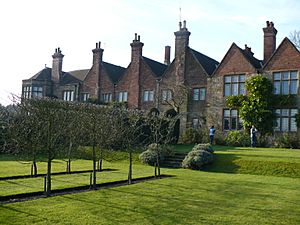Gilbert Millington facts for kids
Gilbert Millington (born around 1598, died 1666) was an English lawyer, known as a barrister. He was also one of the people who played a part in the execution of King Charles I of England. These people are often called Regicides.
Contents
Gilbert Millington's Life
Gilbert Millington was likely born at Felley Priory in England around 1598. He was the oldest son of Anthony and Prudence Millington. He went to Peterhouse, Cambridge for his education.
In 1614, he joined Lincoln's Inn, which is a place where lawyers are trained. By 1621, he became a barrister, meaning he could argue cases in court. He got married in 1618.
Early Career and Public Service
In 1620, Gilbert inherited his father's large estate. This estate was over 800 acres, which is a lot of land! This wealth helped him support important causes in his local area, Nottingham. Later, it helped him in Parliament.
He took on several public jobs in Nottingham. He helped manage the sewer systems. In 1638, he became a Deputy Lieutenant for Nottinghamshire. This was an important local role.
Parliament and the King's Trial
In 1639, Gilbert Millington became a Master of Chancery, a high legal position. The next year, in 1640, he was chosen to be a Member of Parliament (MP) for Nottingham. This was during a very long period known as the Long Parliament.
In 1642, he was again made a deputy-lieutenant for Nottinghamshire. He helped communicate between the governor of Nottingham Castle, Colonel John Hutchinson, and the local county committee. They sometimes disagreed about who controlled the local soldiers.
In 1649, Gilbert Millington was one of the few barristers involved in the trial of Charles I. He was very active during this trial. He was also among those who signed the official document that ordered the king's death.
Later Life and Imprisonment
After the monarchy was brought back to power in 1660, Gilbert Millington was sentenced to death. However, his punishment was later changed to life imprisonment after he appealed.
He spent his final years as a prisoner at Mont Orgueil Castle on the island of Jersey. He passed away there on September 19, 1666.
 | Kyle Baker |
 | Joseph Yoakum |
 | Laura Wheeler Waring |
 | Henry Ossawa Tanner |


